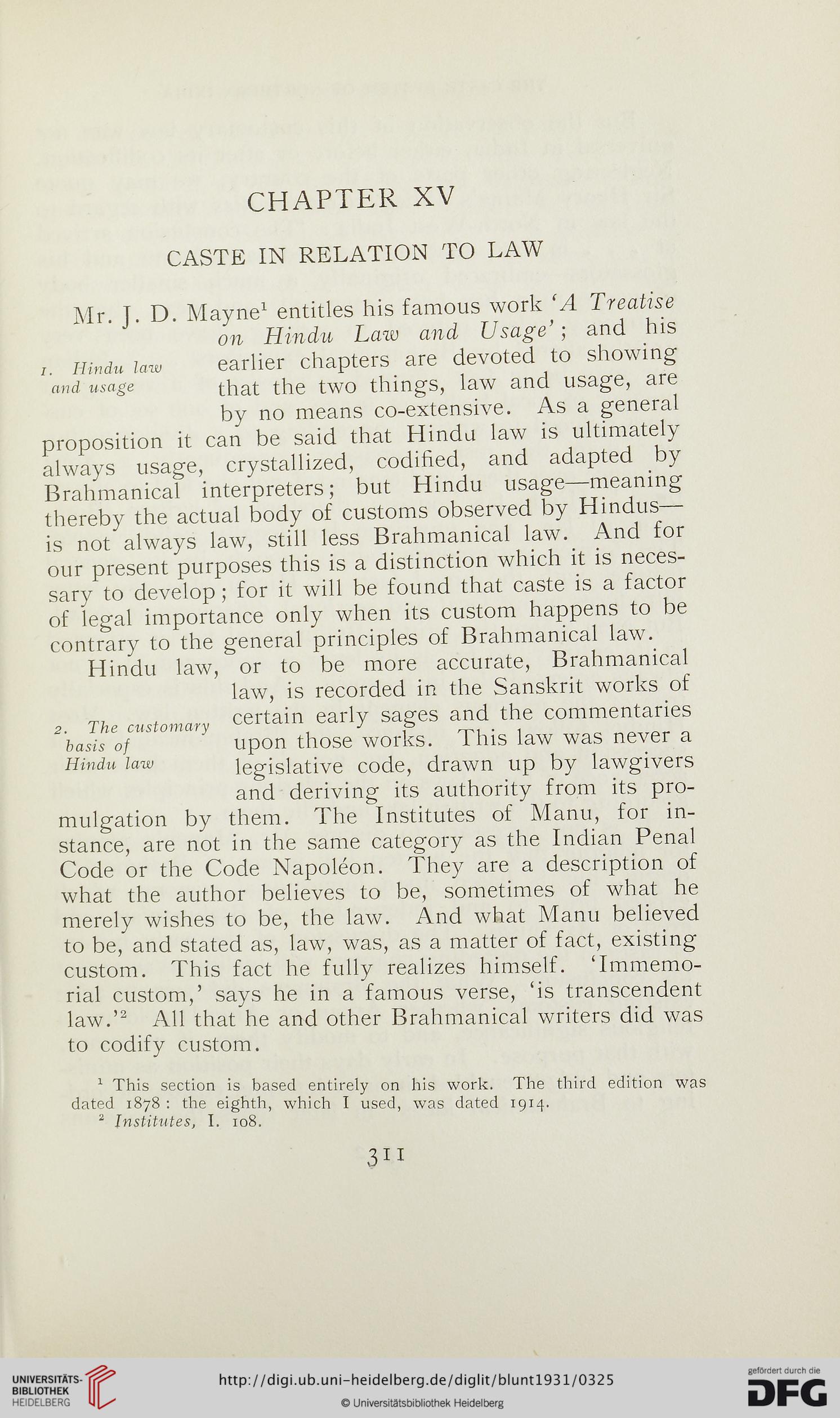CHAPTER XV
CASTE IN RELATION TO LAW
Mr. J. D. Mayne1 entitles his famous work ‘A Treatise
on Hindu Law and Usage’; and his
1. Hindu law earlier chapters are devoted to showing
and usage that the two things, law and usage, are
by no means co-extensive. As a general
proposition it can be said that Hindu law is ultimately
always usage, crystallized, codified, and adapted by
Brahmanical interpreters; but Hindu usage—meaning
tbereby the actual body of customs observed by Hindus—
is not always law, still less Brahmanical law. And for
our present purposes this is a distinction which it is neces-
sary to develop; for it will be found that caste is a factor
of legal importance only when its custom happens to be
contrary to the general principles of Brahmanical law.
Hindu law, or to be more accurate, Brahmanical
law, is recorded in the Sanskrit works of
2. The customary certain early sages and the commentaries
basis of ' upon those works. This law was never a
Hindu law legislative code, drawn up by lawgivers
and deriving its authority from its pro-
mulgation by them. The Institutes of Manu, for in-
stance, are not in the same category as the Indian Penal
Code or the Code Napoleon. They are a description of
what the author believes to be, sometimes of what he
merely wishes to be, the law. And what Manu believed
to be, and stated as, law, was, as a matter of fact, existing
custom. Tbis fact be fully realizes himself. Tmmemo-
rial custom,’ says he in a famous verse, ‘is transcendent
law.’-3 AU that he and other Brahmanical writers did was
to codify custom.
This section is based entirely on his work. The third edition was
dated 1878 : the eighth, which I used, was dated 1914.
2 Institutes, I. 108.
CASTE IN RELATION TO LAW
Mr. J. D. Mayne1 entitles his famous work ‘A Treatise
on Hindu Law and Usage’; and his
1. Hindu law earlier chapters are devoted to showing
and usage that the two things, law and usage, are
by no means co-extensive. As a general
proposition it can be said that Hindu law is ultimately
always usage, crystallized, codified, and adapted by
Brahmanical interpreters; but Hindu usage—meaning
tbereby the actual body of customs observed by Hindus—
is not always law, still less Brahmanical law. And for
our present purposes this is a distinction which it is neces-
sary to develop; for it will be found that caste is a factor
of legal importance only when its custom happens to be
contrary to the general principles of Brahmanical law.
Hindu law, or to be more accurate, Brahmanical
law, is recorded in the Sanskrit works of
2. The customary certain early sages and the commentaries
basis of ' upon those works. This law was never a
Hindu law legislative code, drawn up by lawgivers
and deriving its authority from its pro-
mulgation by them. The Institutes of Manu, for in-
stance, are not in the same category as the Indian Penal
Code or the Code Napoleon. They are a description of
what the author believes to be, sometimes of what he
merely wishes to be, the law. And what Manu believed
to be, and stated as, law, was, as a matter of fact, existing
custom. Tbis fact be fully realizes himself. Tmmemo-
rial custom,’ says he in a famous verse, ‘is transcendent
law.’-3 AU that he and other Brahmanical writers did was
to codify custom.
This section is based entirely on his work. The third edition was
dated 1878 : the eighth, which I used, was dated 1914.
2 Institutes, I. 108.





